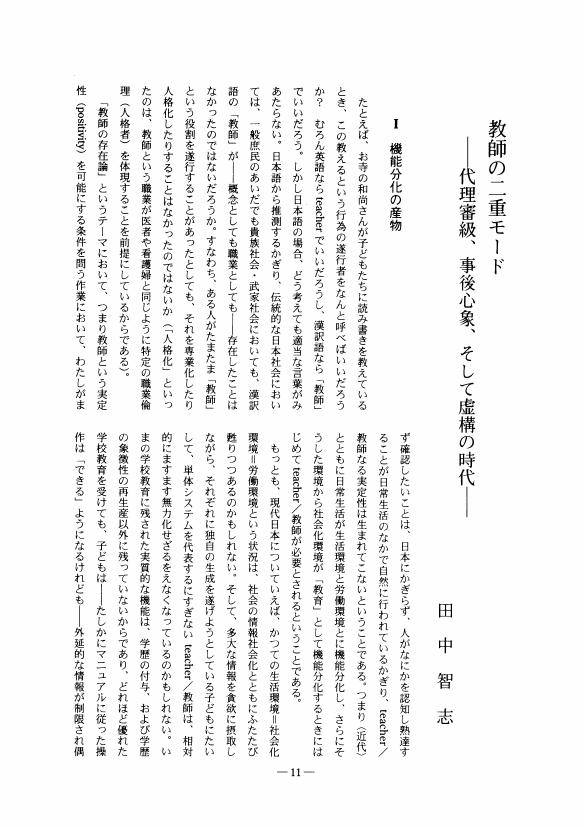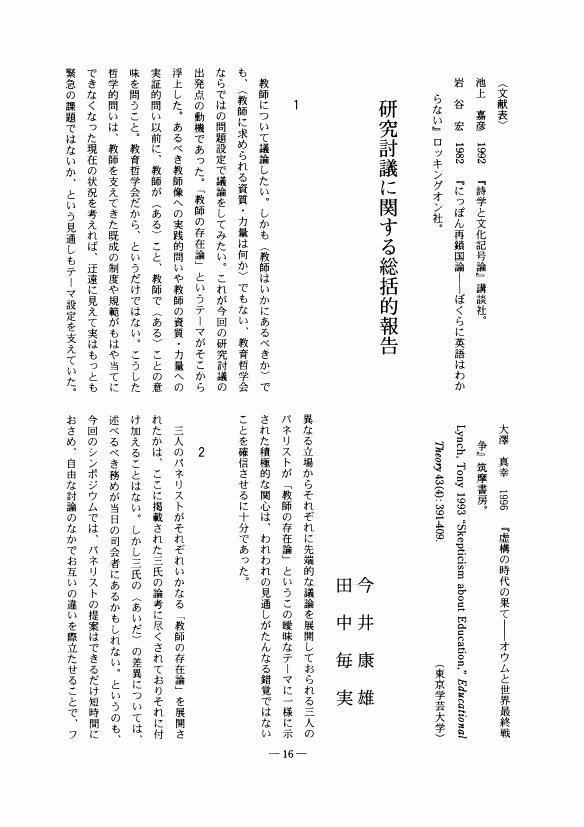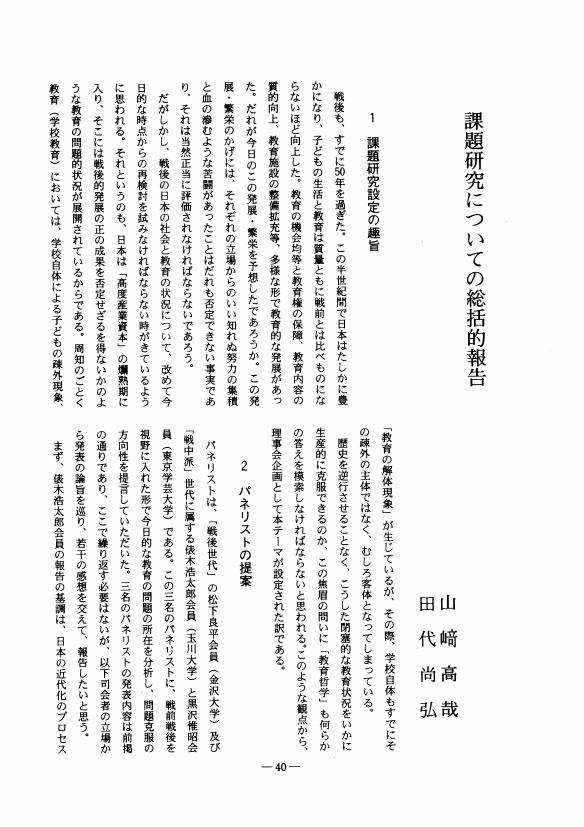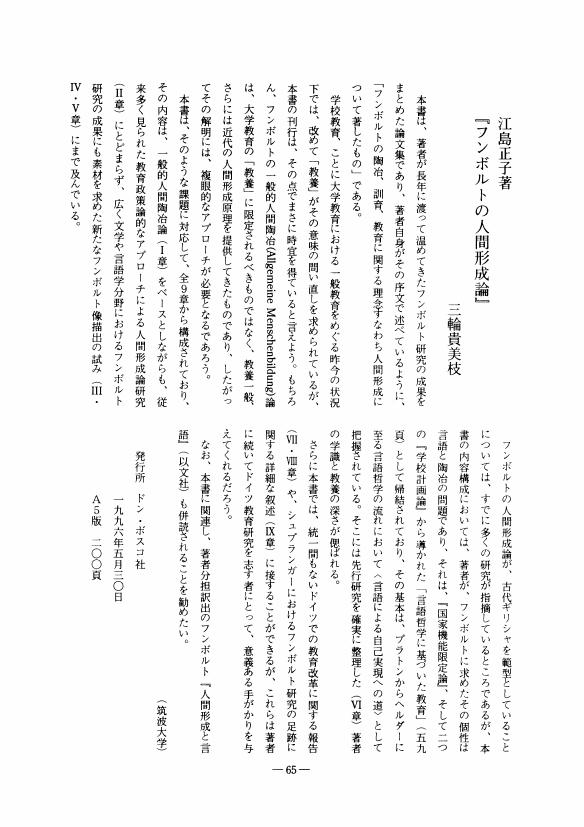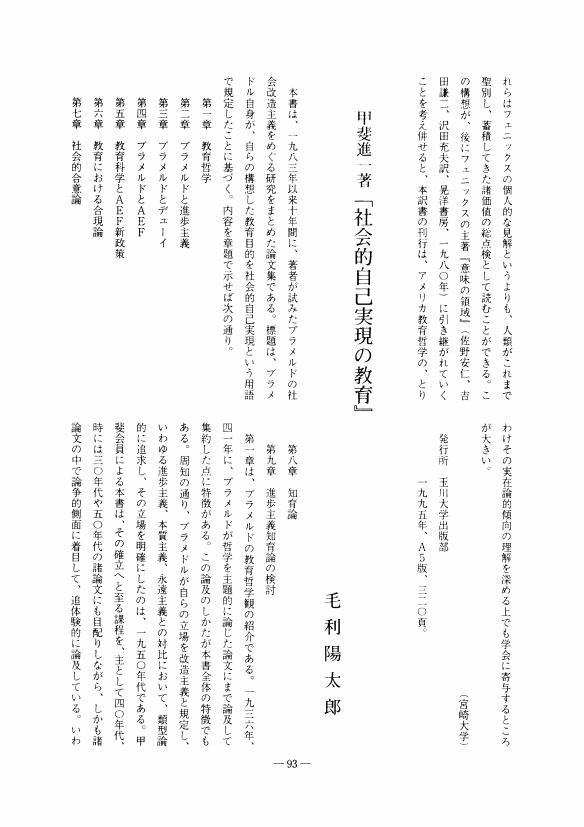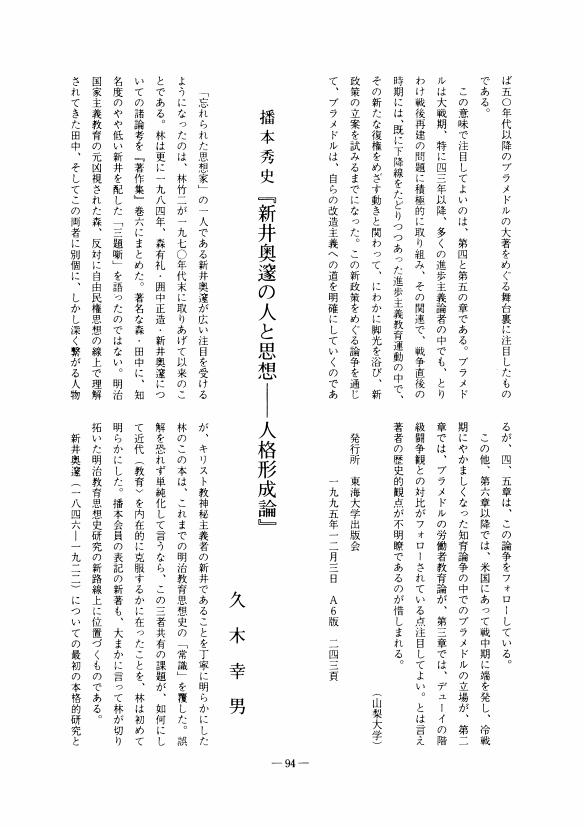1 0 0 0 OA 日本ペスタロッチー・フレーベル学会編『ペスタロッチー・フレーベル事典』
- 著者
- 宮寺 晃夫
- 出版者
- 教育哲学会
- 雑誌
- 教育哲学研究 (ISSN:03873153)
- 巻号頁・発行日
- vol.1997, no.75, pp.81, 1997-05-10 (Released:2009-09-04)
1 0 0 0 OA ペスタロッチー教育論における「学校」の位置 後期著作を中心として
- 著者
- 大澤 裕
- 出版者
- 教育哲学会
- 雑誌
- 教育哲学研究 (ISSN:03873153)
- 巻号頁・発行日
- vol.1997, no.76, pp.1-14, 1997-11-10 (Released:2009-09-04)
- 参考文献数
- 48
Pestalozzi's pädagogischer Gedanke tiber die Rolle der “Schule” schwankt zwischen seinen fruhen und späten Werken. Zweck dieser Arbeit ist es, die Stelle der Schule in seiner späten Werken zu betrachten. In dieser Abhandlung sollen die drei folgenden Gesichtspunkte behandelt werden; (1) die Schule, die die Funktion der gemeinschaftlichen Erziehung hat, (2) die Einschrankungen des Hauses und die eigene Rolle der Schule, (3) Veredelung und die Schule. Endlich ist sein später Gedanke über Schule folgendermaSen zusammengefaBt. Nach seiner Einsicht, (1) ist die Schulerziehung der die Schuler zu derjenigen Berufstechnik und Wissenschaft fuhrende Anfang, den das Haus ihnen nicht geben kann. (2) Die Schule funktioniert als das Organ, das die im Haus gewonnenen Kenntnisse erweitert, und (3) als das Organ, das den Schillern die im Haus gewonnenen Erlebnisse verallgemeinert, und (4) als der geschützte Ort, wo viele andere Menschen miteinander menschlich leben, und (5) als der Raum, wo sie zukünftige soziale Normen erleben. Und die Schule hat die Funktion, durch die Individuen ihre Lebensweise zu steigern wodurch sie für die Gesellschaft nützliche Menschen werden können. Nach Pestalozzi's Gedanken kann die Schule, wenn sie nicht als eine beschrankte Erziehungskraft sich erkennt, nicht geniigend funktionieren, und nicht nur das, sondern auch sie wirkt als Organ, das sekundäre negative Kräfte hat.
1 0 0 0 OA ペスタロッチーにおける直観概念 生成発展とその周辺
- 著者
- 伊藤 敏子
- 出版者
- 教育哲学会
- 雑誌
- 教育哲学研究 (ISSN:03873153)
- 巻号頁・発行日
- vol.1997, no.76, pp.15-29, 1997-11-10 (Released:2009-09-04)
- 参考文献数
- 37
Der Begriff der “Anschauung” ist in der Pädagogik Pestalozzis zentral. Dieser Begriff ist in einem doppelten Sinne zweigliedrig. Erstens gliedert er sich nach der äusseren und der inneren Anschauung, zweitens besteht die innere Anschauung wiederum aus der “mich anse-henden” inneren Anschauung und der “Gott ansehenden” inneren Anschauung. Die vor-liegende Arbeit geht dem Entstehungsund dem Verstärkungsprozess dieses Begriffs nach. Das Hauptinteresse gilt den verschiedenen Ideen, von denen der Anschauungsbegriff in ver-schiedenen Phasen seiner Genese beeinflusst wurde. Bezüglich der äusseren Anschauung steht der Einfluss des Sensualismus im Zentrum. Die von Pestalozzi zitierten Bucher belegen, dass er sich in der Entstehungsphase seiner Anschauungslehre mit dem deutschen Sensualismus auseinandersetzte, während er in der Verstärkungsphase der Anschauungslehre den franzasischen Sensualismus bevorzugte. Bezüglich der inneren Anschauung wird die Betonung des Gemüts eingehend untersucht. Obgleich Pestalozzi zu keiner Zeit seines Lebens konfesionell gebunden war, brachte ihn seine Betonung der Gemiitskrafte immer näher zum religiösen Gedanken, wonach die “Gott an-sehende” innere Anschauung belebt werden soll.
1 0 0 0 OA 技術論から相互関係論へ-〈教師-生徒〉関係の組みかえ-
- 著者
- 高橋 勝
- 出版者
- 教育哲学会
- 雑誌
- 教育哲学研究 (ISSN:03873153)
- 巻号頁・発行日
- vol.1997, no.75, pp.5-10, 1997-05-10 (Released:2010-05-07)
- 参考文献数
- 12
1 0 0 0 OA 教師の二重モード 代理審級、事後心象、そして虚構の時代
- 著者
- 田中 智志
- 出版者
- 教育哲学会
- 雑誌
- 教育哲学研究 (ISSN:03873153)
- 巻号頁・発行日
- vol.1997, no.75, pp.11-16, 1997-05-10 (Released:2009-09-04)
- 参考文献数
- 4
1 0 0 0 OA 研究討議に関する総括的報告
- 著者
- 今井 康雄 田中 毎実
- 出版者
- 教育哲学会
- 雑誌
- 教育哲学研究 (ISSN:03873153)
- 巻号頁・発行日
- vol.1997, no.75, pp.16-22, 1997-05-10 (Released:2009-09-04)
1 0 0 0 OA 戦後教育の哲学的基底 自己矛盾としての〈子ども尊重〉の思想の “乱熟”
- 著者
- 松下 良平
- 出版者
- 教育哲学会
- 雑誌
- 教育哲学研究 (ISSN:03873153)
- 巻号頁・発行日
- vol.1997, no.75, pp.28-33, 1997-05-10 (Released:2010-05-07)
- 参考文献数
- 3
1 0 0 0 OA 戦後教育を問う ポストモダンの視界から
- 著者
- 黒沢 惟昭
- 出版者
- 教育哲学会
- 雑誌
- 教育哲学研究 (ISSN:03873153)
- 巻号頁・発行日
- vol.1997, no.75, pp.34-39, 1997-05-10 (Released:2009-09-04)
1 0 0 0 OA 課題研究についての総括的報告
- 著者
- 山崎 高哉 田代 尚弘
- 出版者
- 教育哲学会
- 雑誌
- 教育哲学研究 (ISSN:03873153)
- 巻号頁・発行日
- vol.1997, no.75, pp.40-46, 1997-05-10 (Released:2010-01-22)
1 0 0 0 OA ジルーの批判的教育学に関する一考察-「差異」と公共領域-
- 著者
- 上地 完治
- 出版者
- 教育哲学会
- 雑誌
- 教育哲学研究 (ISSN:03873153)
- 巻号頁・発行日
- vol.1997, no.75, pp.47-59, 1997-05-10 (Released:2009-09-04)
- 参考文献数
- 39
This paper analyzes the concept of “difference” in Giroux's critical pedagogy and, via the author's preliminary hypothesis, inquires into the relationship of “difference” and social emancipation.During the 1990s Giroux has emphasized “difference”, especially what the author refers to as the complexity of “difference.” However, in light of Giroux's theory for comprehensive social emancipation, the concept of “difference” simultaneously produces some problematic relationships. The theory of emancipation which is based on only one “difference”, cannot be applied to another “difference” because “difference” exists in plural categories. Moreover, categorizing many kinds of “difference” leads to specific and isolated theories.The solution which Giroux finds for this question in his critical pedagogy refers to the public sphere. Giroux's idea of the public sphere is radically democratic and in that sphere one is able not only to guarantee diverse discourses based on “difference”, but also lead to social emancipation. Also in that sphere one needs transformative intellectuals who articulate the idea of “difference” with reference to emancipation.
1 0 0 0 OA 広瀬俊雄著『ペスタロッチーの言語教育思想』
- 著者
- 森川 直
- 出版者
- 教育哲学会
- 雑誌
- 教育哲学研究 (ISSN:03873153)
- 巻号頁・発行日
- vol.1996, no.74, pp.56-60, 1996-11-10 (Released:2009-09-04)
1 0 0 0 OA 和田修二編『教育的日常の再構築』
- 著者
- 高橋 勝
- 出版者
- 教育哲学会
- 雑誌
- 教育哲学研究 (ISSN:03873153)
- 巻号頁・発行日
- vol.1996, no.74, pp.61, 1996-11-10 (Released:2009-09-04)
1 0 0 0 OA 岡田渥美著『人間形成論-教育学の再構築のために』
- 著者
- 沼田 裕之
- 出版者
- 教育哲学会
- 雑誌
- 教育哲学研究 (ISSN:03873153)
- 巻号頁・発行日
- vol.1996, no.74, pp.62, 1996-11-10 (Released:2009-09-04)
1 0 0 0 OA クリストフ・フユール著 天野正治・木戸裕・長島啓記訳『ドイツの学校と大学』
- 著者
- 今井 重孝
- 出版者
- 教育哲学会
- 雑誌
- 教育哲学研究 (ISSN:03873153)
- 巻号頁・発行日
- vol.1996, no.74, pp.63, 1996-11-10 (Released:2009-09-04)
1 0 0 0 OA 市村尚久・天野正治・増淵幸男編『教育関係の再構築』
- 著者
- 立川 明
- 出版者
- 教育哲学会
- 雑誌
- 教育哲学研究 (ISSN:03873153)
- 巻号頁・発行日
- vol.1996, no.74, pp.64, 1996-11-10 (Released:2009-09-04)
1 0 0 0 OA 江島正子著『フンボルトの人間形成論』
- 著者
- 三輪 貴美枝
- 出版者
- 教育哲学会
- 雑誌
- 教育哲学研究 (ISSN:03873153)
- 巻号頁・発行日
- vol.1996, no.74, pp.65, 1996-11-10 (Released:2009-09-04)
1 0 0 0 OA 「中間者」としての教師-教職への存在論的接近
- 著者
- 佐藤 学
- 出版者
- 教育哲学会
- 雑誌
- 教育哲学研究 (ISSN:03873153)
- 巻号頁・発行日
- vol.1997, no.75, pp.1-5, 1997-05-10 (Released:2009-09-04)
- 参考文献数
- 6
1 0 0 0 OA 甲斐進一著「社会的自己実現の教育』
- 著者
- 毛利 陽太郎
- 出版者
- 教育哲学会
- 雑誌
- 教育哲学研究 (ISSN:03873153)
- 巻号頁・発行日
- vol.1996, no.73, pp.93-94, 1996-05-10 (Released:2009-09-04)
1 0 0 0 OA 播本秀史『新井奥邃の人と思想-人格形成論』
- 著者
- 久木 幸男
- 出版者
- 教育哲学会
- 雑誌
- 教育哲学研究 (ISSN:03873153)
- 巻号頁・発行日
- vol.1996, no.73, pp.94-95, 1996-05-10 (Released:2009-09-04)
- 著者
- 青木 英実
- 出版者
- 教育哲学会
- 雑誌
- 教育哲学研究 (ISSN:03873153)
- 巻号頁・発行日
- vol.1996, no.74, pp.1-15, 1996-11-10 (Released:2010-01-22)
- 参考文献数
- 81
K.R.Popper, one of the greatest philosophers of this century, has exerted some influence upon contemporary philosophy, science, politics and education. During his early years at Vienna, he received training in education and child-psychology for a future school teacher. The current paper aims to explicate the relationship of Popper's philosophy and the thought of the “Wiener educational reform”, especially that of G. Kerschensteiner.Popper criticized the logic and psychology of induction, along with the theory of verification, of the “Wiener Kreis.” This criticism of inductive logic was closely related with his early study of education and child-psychology. In his early articles Popper opposed the contemporary teaching method which had been based upon the Herbartian associationism. Both the logic of induction and the teaching method of associationism had rested upon the “bucket theory” of knowledge, where knowledge was regarded as consisting of atomic experiences or molecular elements. In opposition to such a theory of knowledge and learning, Popper asserted that all human learning consisted in the modification of previous knowledge or of disposition. Here Popper's theory of knowledge shared something in common with the ideas and motif of the educational theory of the “Wiener educational reform.” Thus the activistic view of the child and of education of the “New Education” in 20th century Europe, had a great impact on the contemporary philosophy and thought in general, through the philosophy of K.R.Popper.


